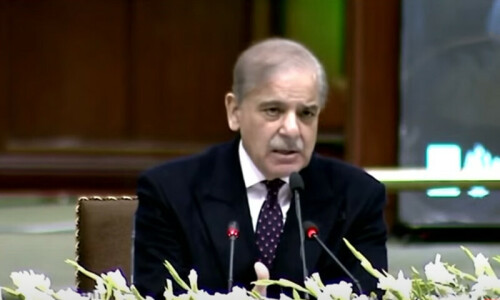ISLAMABAD: After a delay of almost five months, a five-bench Supreme Court bench will resume the hearing of a set of challenges to the trial of civilians by military courts on Monday (Oct 23).
The bench will consist of Justices Ijaz-ul-Ahsan, Munib Akhtar, Yayha Afridi, Sayyed Mazahar Ali Akbar Naqvi and Ayesha A. Malik and will take up 13 different petitions moved to challenge the trial of civilians by military courts.
Earlier, a six-judge bench had heard the matter but after the retirement of former chief justice of Pakistan (CJP) Umar Ata Bandial, the bench has been reduced to five judges. And since the matter has been partly heard, the incumbent CJP is not sitting on the bench.
Former CJP Jawwad S. Khawaja, senior counsel Aitzaz Ahsan, Karamat Ali, Zaman Khan Vardag, Junaid Razzaq, the Supreme Court Bar Association, PTI chief Imran Khan, Hafeezullah Khan Niazi, Lt-Col Inam-ul-Rahiem, Naeemullah Qureshi etc have filed the petitions before the apex court.
After the Oct 11 upholding of the Supreme Court (Practice and Procedure) Act 2023, it is now a legal requirement that all cases moved under Article 184(3) involving interpretation of the Constitution should be heard by a bench consisting of not less than five SC judges.
And under Section 5 of the law, any decision by the five-judge bench could be challenged and any appeal in this regard could be filed within 30 days from the court order which will have to be fixed within a period not exceeding 14 days.
It is likely that if appeals are filed against the order of the bench, it may be heard by a larger bench consisting of judges who have not heard the matter earlier in the first round of litigation. It is expected that if such a bench is constituted, the incumbent CJP may head that bench.
During earlier hearings, the SC had turned down the government request to constitute the full court consisting of all available judges.
Already the federal government at the last hearing on May 27 had assured the apex court that till date no formal trial had commenced against 102 individuals who were under the custody of military authorities in relation to the May 9 incidents of violence.
Then Attorney General of Pakistan (AGP) Mansoor Usman Awan had told the court that all the accused were still undergoing investigations and no trial ultimately would be conducted in a summary manner.
On Sept 9, Imran Khan had approached the SC with a plea to declare amendments in the Official Secrets (Amendment) (OSA) Act, 2023 and the Pakistan Army (Amendment) (PAA) Act, 2023, as unconstitutional and without lawful authority and ultra vires to the Constitution.
The petition also requested the apex court to suspend the operation of the two amendments in the OSA and PAA. Moved through Advocate Shoaib Shaheen, the petition argued that a bill will not be an act of parliament until and unless it receives the assent of the president under Article 75 of the Constitution.
On Aug 20, 2023 President Dr Arif Alvi shared a post on X (formerly Twitter) in which he wrote that he did not sign the OSA (Amendment) Bill, 2023 and PAA (Amendment) Bill, 2023 as he disagreed with them.
Recently an application had been filed by Junaid Razzaq with a request to fix the military courts’ case as early as possible since he had been informed that the trial by military courts of civilians had commenced in violation of SC directions not to commence the trial before seeking prior permission from the apex court. The applicant pleaded before the court that early hearing of the matter will be in the interest of justice, otherwise if the trial of his son — Azam Junaid — commenced and concluded in haste, the petitioner would suffer irreparable loss.
Published in Dawn, October 21st, 2023













































